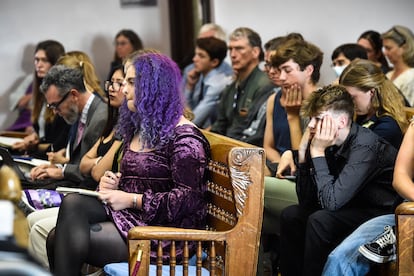Montana officials downplay first-of-its-kind climate trial
The 16 plaintiffs range in age from 5 to 22 years old. They say they’re being harmed by wildfire smoke, excessive heat and other effects of climate change

Montana officials sought to downplay a first-of-its-kind trial taking place over the state’s obligations to protect residents from climate change, saying Monday that a victory by the young plaintiffs would not change approvals for fossil fuel projects.
Attorneys for Montana’s Republican attorney general laid out their defense following a week of often emotional testimony in state court from young people who sued the state in 2020.
The 16 plaintiffs, ranging in age from 5 to 22 years old, say they’re being harmed by wildfire smoke, excessive heat and other effects of climate change. They’re asking a judge to declare unconstitutional a state law that prevents agencies from considering greenhouse gases impacts when they issue permits for fossil fuel development.
Final arguments were expected Tuesday — days earlier than scheduled after the state did not call one expert witness who was expected to testify and sharply limited the testimony of a second expert. Plaintiffs’ attorneys had questioned the credibility of the two witnesses, who said Montana’s greenhouse gas contributions were of little significance versus global totals.
Scientists say greenhouse gas emissions from coal, oil and natural gas are making Earth hotter and that every additional ton emitted makes a difference.
Montana has never denied a permit for a fossil fuel project, according to the plaintiffs’ attorneys. But the state’s lead environmental regulator said Monday that permitting practices would not change if the young environmentalists win their case.
“We do not have the authority to not permit something that fully complies with the law,” said Department of Environmental Quality Director Chris Dorrington. “We are not the ones that created the law. We are the ones that implement the law,”
State officials also drew a distinction between the law being challenged — a provision of the Montana Environmental Protection Act that they characterized as “procedural” — and regulatory acts such as the Clean Air Act of Montana.
Only regulatory acts can used as the basis for permit rejections, and those don’t allow permits to be denied in Montana based on climate impacts, said DEQ Air, Energy and Mining Division Administrator Sonja Nowakowski.
The young plaintiffs testified over five days last week that climate change was marring their lives, with smoke from worsening wildfires choking the air they breathe. Drought is drying up rivers that sustain agriculture, fish, wildlife and recreation.
Olivia Vesovich, 20, a student at the University of Montana who grew up in Missoula, said she suffers from breathing problems that make wildfire smoke nearly unbearable.
As her respiratory reactions grew worse during smoke events that have shrouded Missoula, Vesovich said her mother in recent years started taking them on trips during fires in search of cleaner air — to Washington state, Idaho and elsewhere in Montana.
“It feels like it’s suffocating me, like if I’m outside for minutes,” Vesovich said. “Climate change is wreaking so much havoc on our world right now and I know that will only be getting worse.”
In prior rulings, State District Judge Judge Kathy Seeley significantly narrowed the scope of the case. Even if the plaintiffs prevail, Seeley has said she would not order officials to formulate a new approach to address climate change.
Instead, the judge could issue what’s called a “declaratory judgment,” saying officials violated the state Constitution. That would set a new legal precedent of courts weighing in on cases typically left to the government’s legislative and executive branches.
The plaintiffs are represented by attorneys for Our Children’s Trust, an Oregon environmental group that’s filed similar lawsuits in every state since 2011. None had previously reached trial. A climate case filed by the group in Montana a decade ago was rejected by the state Supreme Court.
Carbon dioxide, which is released when fossil fuels are burned, traps heat in the atmosphere and is largely responsible for the warming of the climate. Carbon dioxide levels in the air this spring reached the highest levels they’ve been in over 4 million years, the National Oceanic Atmospheric Administration said earlier this month. Greenhouse gas emissions also reached a record last year, according to the International Energy Agency.
Sign up for our weekly newsletter to get more English-language news coverage from EL PAÍS USA Edition
Tu suscripción se está usando en otro dispositivo
¿Quieres añadir otro usuario a tu suscripción?
Si continúas leyendo en este dispositivo, no se podrá leer en el otro.
FlechaTu suscripción se está usando en otro dispositivo y solo puedes acceder a EL PAÍS desde un dispositivo a la vez.
Si quieres compartir tu cuenta, cambia tu suscripción a la modalidad Premium, así podrás añadir otro usuario. Cada uno accederá con su propia cuenta de email, lo que os permitirá personalizar vuestra experiencia en EL PAÍS.
¿Tienes una suscripción de empresa? Accede aquí para contratar más cuentas.
En el caso de no saber quién está usando tu cuenta, te recomendamos cambiar tu contraseña aquí.
Si decides continuar compartiendo tu cuenta, este mensaje se mostrará en tu dispositivo y en el de la otra persona que está usando tu cuenta de forma indefinida, afectando a tu experiencia de lectura. Puedes consultar aquí los términos y condiciones de la suscripción digital.








































